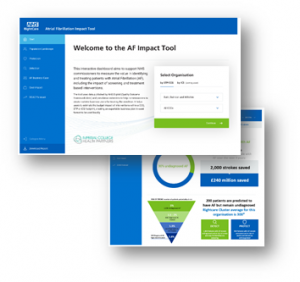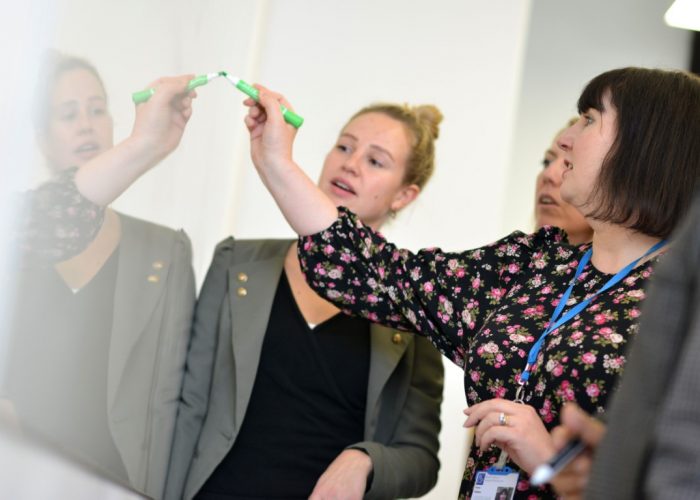Andi Orlowski , Head of Business Intelligence, and Julia Wilkins, Analytics Lead, explain how the ICHP business intelligence team works to develop effective business cases from the ground up
, Head of Business Intelligence, and Julia Wilkins, Analytics Lead, explain how the ICHP business intelligence team works to develop effective business cases from the ground up
NHS organisations and those aiming to deliver services into the NHS often approach us for help with developing business cases in order to win contracts, funding or grants to implement new ideas and initiatives.
We take a very pragmatic approach to building such business cases, as it’s easy to overcomplicate them so that they become unwieldy and difficult to manage, but that doesn’t mean that our work is simplistic – far from it.
The business cases that we create require access to appropriate datasets, and with our access to even the most granular level of patient activity data we can build comprehensive proposals that include the best possible data available plus accompanying evidence to demonstrate real value to the NHS across the whole system.
This evidence is crucial because whether or not initiatives receive funding isn’t decided by one organisation in isolation, but by looking at the impact across the whole health economy, so it’s important that we don’t just measure the positive impact of a new service on an individual patient at a specific time, but that we also measure the likely return on investment across the whole health system. Quite often there’s a requirement to show return on investment within the same financial year and so we include the best longitudinal data available – which tracks the same type of information on the same patients at multiple points over a period of time – in order to create a robust business case.
The ICHP team has access (via our data partners Harvey Walsh) to – and extensive experience of using – a range of national data sources including HES data (linked at the HES record level over 10 years via HES ID)*, national SUS data, QOF, ePACT, MHMDS and ONS data. We also have access to the North West London Whole Systems Integrated Care (WSIC) database – a unique system which links primary, secondary, mental health and social care data for over two million people and 370 GP practices in North West London. When we develop a business case we bring together all the relevant publicly available data plus any relevant data supplied by the client.
We pre-populate business cases with the appropriate data so that they are ready to go with the data already incorporated (although clients may choose to tailor the data further for their specific purposes). We’re usually asked to include budget impact modelling, which uses this data and analytic tools to make it really clear how the proposed new business initiative is likely to impact on the organisation’s budget, but we’re also frequently asked to demonstrate exactly how the initiative is likely to impact on cost effectiveness and cost utility – and these are areas where the skills of the health economists in the team are unbeatable.
Building successful business cases for others not only requires data, but also requires an in-depth understanding of that data and experience of working with it.
Part of our business case and data analysis process is about engaging with stakeholders to understand the problem, how the system needs to change, the current baseline picture, which parts of the system are amenable to change, and the eventual impact they want to make.
 To make an impact these business cases must also be visually appealing and intuitive to use and create usable outputs. We use a ‘business case generator’ to create a final Word document that presents the data in a ‘board ready’ format with all the information presented in an easily accessible, usable style.
To make an impact these business cases must also be visually appealing and intuitive to use and create usable outputs. We use a ‘business case generator’ to create a final Word document that presents the data in a ‘board ready’ format with all the information presented in an easily accessible, usable style.
For example, the AF impact tool commissioned by NHS RightCare is an online tool designed with the user in mind. This interactive dashboard generates a personalised business case in Word document format that users can edit to suit their specific needs and use locally to shape services and ultimately save lives.
There’s a vast range of capabilities and backgrounds within our business intelligence team and ICHP as a whole that we can draw on. We can also tap into expertise within our health partners including universities and trusts, and have close links to other external resources such as Public Health England and NHS England. This means that as well as having access to more datasets than any other organisation, in-house analytics and health economics experts, we also have very good connections for expert opinion, and we find that these links to academic rigour can be a big asset for our clients. Expert opinion can not only inform the business case but can also be a resource to call on during the later implementation and stakeholder meetings, adding further credence.
Our teams can also offer additional complementary services. For example, anyone putting in an application for the innovation technology tariff payment (ITP) will be asked for evidence of how they can prove value in the ‘real world’ and how they will measure the impact that the technology makes over time and the benefits for both patients and the NHS. This is another area in which we can offer specialist support, for example through communication tools such as posters, publications and blogs, organising and facilitating stakeholder meetings, and developing visualisations such as the dashboards we recently created for NHS England.
What’s most important to both of us at ICHP is that anything we work on must be designed to make a positive impact for patients and communities. By working with those who share that aim, and drawing on our skills, experience and resources, we can create persuasive business cases that have the best chance of success.
*Derived HES outputs are created in partnership with Harvey Walsh Ltd, who work collaboratively with ICHP in the provision of data insights from their proprietary database AXON 360 (Harvey Walsh NHS Digital DSA: DARS-NIC-05934-M7V9K)



